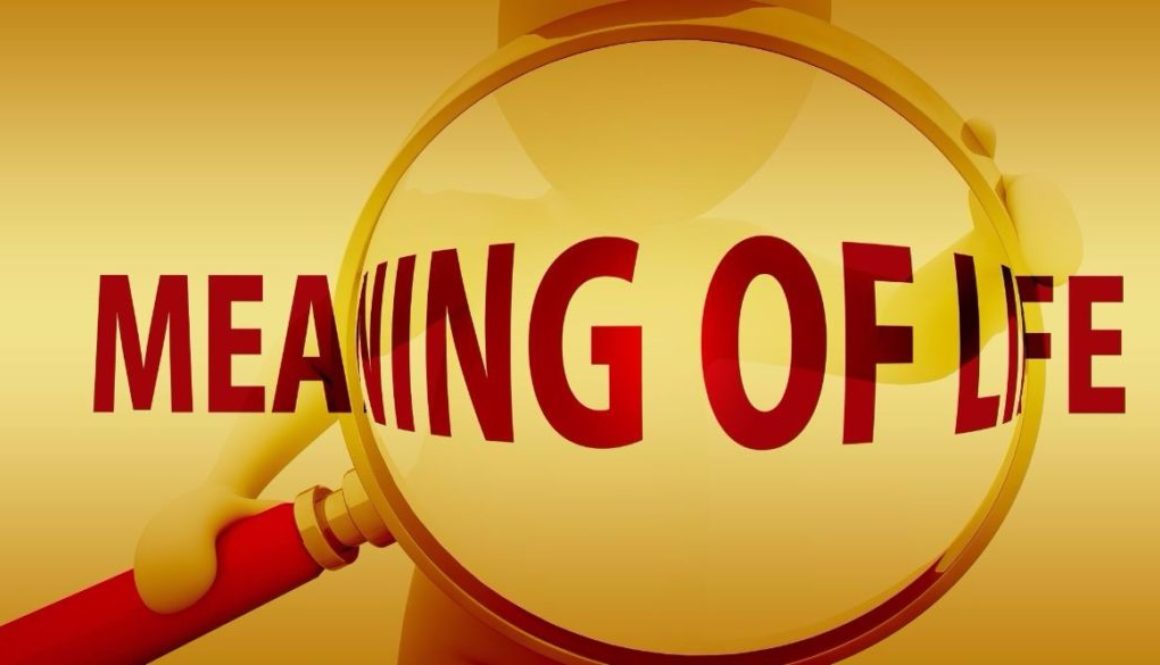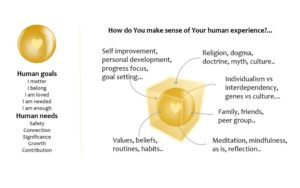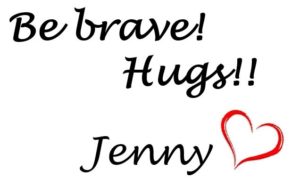What’s the point?

Okay so let’s look at one on the Huge questions 🙂 What is the meaning of life?
Do you ever think about it? I do. I refer to the personal approach; What is the meaning of my life? Have you ever been asked that question by a child, by someone who looks up to you and trusts that you will be able to provide some answers or at least some clues? I’ve noticed that the level of my own commitment and trust in my answer differ some depending on what state of mind I’m in when I‘m asked.
When I’m in a low state I tend to not even remember my theories. It’s as if some part of me don’t want to get it together. In a low state my internal answer is usually somewhere along the lines of “I have no frigging clue!”, “Leave me alone!” or “To eat massive amounts of sugar!” That’s not what I say out loud.. of course. Out loud I usually get myself together enough to recite some version of the truth I really know to be true. I latch on to pure faith in that I will feel that truth again and I stick with what I’ve so far been able to piece together as my current version of an answer.
Easy answer – difficult to do
There are so many different tastes and views on meaning and happiness. Self-help sections intertwined with mindfulness practices. I believe that we’re all looking for pretty much the same basic thing;
To enjoy this human experience!
But if the end goal is the same for everyone, shouldn’t the solutions then be pretty easy to define? Nah, the thing is that we pursue this goal in endless different ways depending on a myriad of factors.
I’ve come to visualize this diversity of guiding principles as a “cube”. The core is the same and represent the universal human goals and needs. The sides of the cube represent different mindsets and approaches to finding your personal answers and vehicles for experiencing these feelings and to satisfy these needs.

The sides might very well consist of even more/different aspects/mindsets/approaches to life, the ones I’ve used are just examples.
How You describe Your guiding principles is personal and depend on your background. It depends on how you were raised, the people around you and the level of awareness you’re at i.e. how well you can hear and moderate your inner dialogue. I believe it’s also related to how well you’ve learnt to manage your fear.
Still an all too easy answer?
You might argue that, even with the different approaches according to the cube, the goal to enjoy being alive, sounds deceivingly simple. If the goal is to have that feeling then just go ahead and enjoy! Right?
Maybe.
Enter the concept of timeframe, the difference between short term and long term. Is the pleasure of the moment valued differently than the feeling of achieving goals that demand restraining from instant temporary pleasures?
Yes, because the enjoyment is different. The positive consequences and the case for resisting short term pleasure and for combating urges in the moment is well described in the book The Marshmallow test by Walter Mischel.
Personally I rely on neuroscience when it comes to this topic. Short term pleasure is SUPER great! But it’s by its very definition a temporary experience. You do something that makes your body/brain produce the feel good hormones, endorphins, dopamine, serotonin and oxytocin. These hormones feel great and believe me I also seek them out and thoroughly enjoy them when they flood my system. But these feelings will recede, the body will work to get back into balance, and you will be back to your personal baseline. There is nothing wrong or sad about this idea, to me it’s just truth.
Two ways of living the meaning of your life
So basically you have two ways of optimizing this life experience;
- Participate in experiences that give you that chemical mix that feels SO good and/or
- Raise the level of your baseline.
What activities raise your baseline? What short term pleasures bring valuable energy to your life?
These distinctions have been important for me when choosing what activities to spend my hours on in regards to this concept of happiness.
- Pick short term pleasures that support the long term goals
When choosing a short term pleasure I try to make sure that the activity is not something that I will regret participating in when I come down from the high. Eating a piece of cake is fine – eating the entire cake will NOT be. Spending an hour with a fantasy novel on my balcony is relaxing and lets me rest while I will regret mindlessly surfing channels on TV that hour. - Enjoy the short term pleasure!
Also; when actually choosing a short term pleasure that might not be according to my long term goals, eating even that one piece of cake when I’m on a low carb diet, I’ve realized that I used to give myself a shit load of pain (blame) even as I was doing it. This of course seriously damaged the high that I was after and made the whole experience a LOW rather than a high. The trick is to choose quickly and stick with your choice no matter what! Decide and enjoy! - Focus most of your energy on raising the baseline
In the end it will be far more effective, to your happiness, to spend your energy on raising your baseline of happiness instead of chasing temporary thrills. The short answer on how to do this is to follow your intuition and to forcefully focus on the activities that will make you proud of yourself. Not proud in a bloated egotistical way but in a dignified and sublime manner. If you can do something, that you know is truly good, without anyone knowing about it then you’re on the right course.
